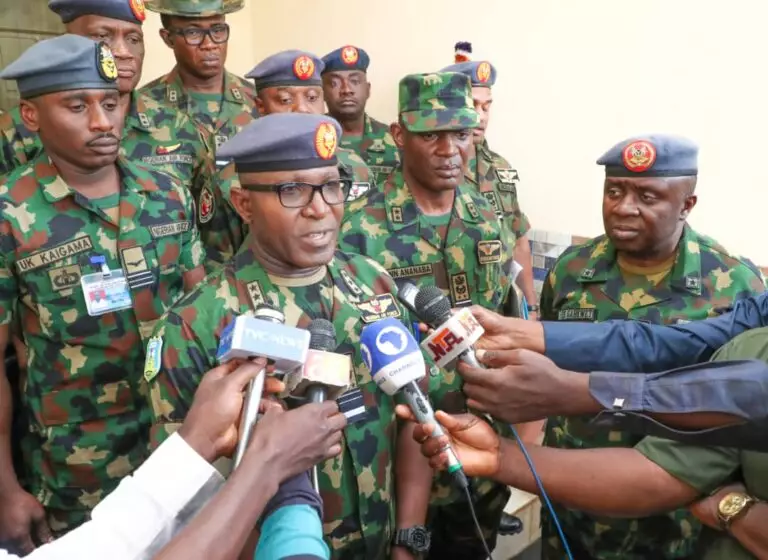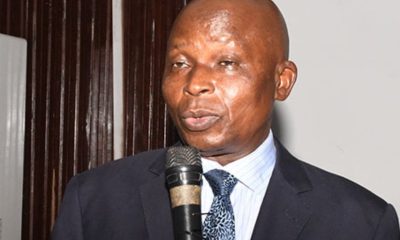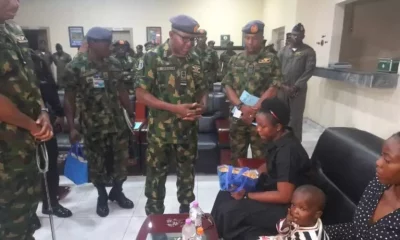Headline
NAF resilience hinges on proactive maintenance culture, logistics support – CAS

The Chief of the Air Staff (CAS), Air Marshal Hassan Abubakar, has reiterated the commitment of the Nigerian Air Force (NAF) to bolster the serviceability rate of its operable platforms, to meet current and emerging security challenges.
Abubakar said this while addressing officers and men during his maiden operational visit to Air Training Command and co-located NAF units in Kaduna.
This is contained in a statement by the Director of Public Relations and Information, NAF, Air Commodore Edward Gabkwet, on Wednesday in Abuja.
The CAS said that NAF would enhance resilience in the conduct of its air operations within a joint and multi-agency setting.
According to him, “to be resilient in our operations, we must proactively address maintenance and logistics support for all our fleet.
“We all have a part to play in ensuring that the NAF surpasses the current average serviceability of over 78 per cent”.
Abubakar commended the efforts of NAF personnel participating in Operation Whirl Punch for upholding the mandate of bringing activities of criminal elements to an end.
He added that their sacrifices and efforts had continued to make positive impacts in parts of the North West and North Central geopolitical zones including the Federal Capital Territory.
The air chief charged all personnel to key into his command philosophy which is “to transform the NAF into an agile and resilient force that effectively meets the airpower demands of national security in all operational environments”.
He promised to leverage on technology, innovation, lessons learnt as well as the personnel and fleets to effectively checkmate the security threats confronting the country.
On safety, the CAS charged personnel to imbibe a safety culture and persistently abide by all safety standards and regulations to prevent mishaps in all air operations.
He noted that accidents occurred due to a chain of events and therefore, they should always be vigilant to break the chain.
In the area of manpower development, Air Marshal Abubakar gave assurance that overseas and local training would be deliberate and targeted to address deficiencies in needed skills and capabilities.
According to him, course nominations will be merit-based to ensure that only the most qualified are selected to give the NAF value for money.
He assured personnel that all their entitlements would be promptly paid as well as intervene in priority areas to make their training and operations more efficient and ensure that personnel and their families lived more comfortably, considering the economic situation in the country.
Abubakar charged them to embrace efficient management of scarce resources in their care.
He said his administration would identify and prioritise the most critical needs and objectives and allocate resources where they could have the greatest impact.
Headline
Fagbemi warns against obstructing EFCC from performing its lawful duty

The Minister of Justice, Lateef Fagbemi, SAN has warned against obstructing the Economic and Financial Crimes Commission (EFCC) from carrying out its lawful duty .
Fagbemi’s warning is contained in a statement in Abuja.
“This is a matter of very grave concern, it is now beyond doubt that the EFCC is given power by the law to invite any person of interest to interact with them in the course of their investigations into any matter, regardless of status.
“Therefore, the least that we can all do when invited, is not to put any obstruction in the way of EFCC, but to honourably answer their invitation.
“A situation where public officials who are themselves subject of protection by law enforcement agents will set up a stratagem of obstruction to the civil and commendable efforts of the EFCC to perform its duty is to say the least, insufferably disquieting’’.
He added that running away from the law will not resolve issues at stake but only exacerbate them.
“Nigeria has a vibrant judicial system that is capable of protecting everyone who follows the rule of law in seeking protection.
“I therefore encourage anyone who has been invited by the EFCC or any other agency to immediately toe the path of decency and civility by honouring such invitation instead of embarking on a temporising self-help and escapism.
“This can only put our country in bad light before the rest of the world’’.
He said institutions of state should be allowed to function effectively and efficiently.
“I stand for the rule of law and will promptly call EFCC, and indeed any other agency to order when there is an indication of any transgressions of the fundamental rights of any Nigerian by any of the agencies’’.
NAN reports that the EFCC had on Wednesday warned members of the public that it was a criminal offence to obstruct officers of the Commission from carrying out their lawful duties.
Section 38(2)(a(b) of the EFCC Establishment Act makes it an offence to prevent officers of the Commission from carrying out their lawful duties. Culprits risk a jail term of not less than five years.
The warning , the EFCC said, became necessary against the background of the increasing tendency by persons and groups under investigation by the Commission to take the laws into their hands by recruiting thugs to obstruct lawful operations of the EFCC.
On several occasions, the anti graft agency said, operatives of the Commission have had to exercise utmost restraint in the face of such provocation to avoid a breakdown of law and order.
Headline
Unknown Gunmen Abduct Channelstv Reporter In Port-harcourt

Some unknown gunmen have kidnapped Joshua Rogers, the ChannelsTV reporter in Port-Harcourt, the Rivers State capital.
Politics Nigeria learnt that Rogers was picked up close to his residence at Rumuosi in Port Harcourt and to an unknown destination by the gunmen around 9pm on Thursday, April 11.
The reporter was driving his official ChannelsTV branded car when the hoodlums accosted, pointed a gun at him and took him away in the same vehicle.
Rogers was said to be returning from his official assignment in Government House after a trip to Andoni for a government event when the incident happened.
Already, the gunmen were said to have contacted his wife and demanded a N30million ransom for bis release.
His cameraman confirmed the incident and appealed to his abductors to set him free unconditionally.
-

 Business6 days ago
Business6 days agoSeplat Energy celebrates a decade of Dual Listing with Bell Ringing Ceremony at Nigerian Stock Exchange
-

 News6 days ago
News6 days agoBDCs now buying dollar at ₦980 — ABCON President
-

 Metro6 days ago
Metro6 days agoOsun Poly Student, Olanrewaju Olatona killed by hit-and-run one-way driver
-

 Headline6 days ago
Headline6 days agoFagbemi warns against obstructing EFCC from performing its lawful duty
-

 News6 days ago
News6 days agoLASG’s maize palliative impactful, says poultry association chair
-

 News6 days ago
News6 days agoWoman killed while crossing road in Anambra
















